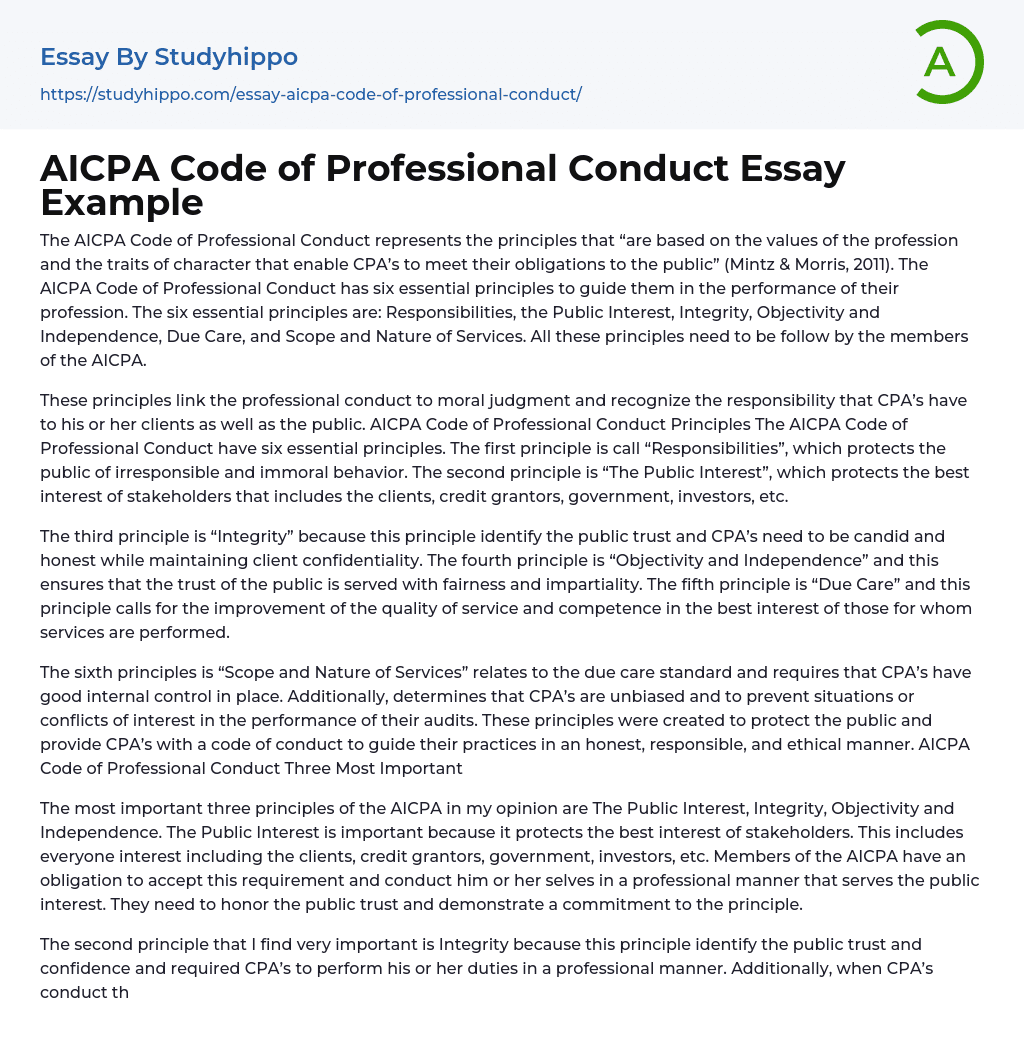The AICPA Code of Professional Conduct represents the principles that “are based on the values of the profession and the traits of character that enable CPA’s to meet their obligations to the public” (Mintz & Morris, 2011). The AICPA Code of Professional Conduct has six essential principles to guide them in the performance of their profession. The six essential principles are: Responsibilities, the Public Interest, Integrity, Objectivity and Independence, Due Care, and Scope and Nature of Services. All these principles need to be follow by the members of the AICPA.
These principles link the professional conduct to moral judgment and recognize the responsibility that CPA’s have to his or her clients as well as the public. AICPA Code of Professional Conduct Principles The AICPA Code of Professional Conduct have six essential principles. The first principle is call “Responsibilities”, which protects the p
...ublic of irresponsible and immoral behavior. The second principle is “The Public Interest”, which protects the best interest of stakeholders that includes the clients, credit grantors, government, investors, etc.
The third principle is “Integrity” because this principle identify the public trust and CPA’s need to be candid and honest while maintaining client confidentiality. The fourth principle is “Objectivity and Independence” and this ensures that the trust of the public is served with fairness and impartiality. The fifth principle is “Due Care” and this principle calls for the improvement of the quality of service and competence in the best interest of those for whom services are performed.
The sixth principles is “Scope and Nature of Services” relates to the due care standard and requires that CPA’s have good internal control in place. Additionally, determines that CPA’s are unbiase
and to prevent situations or conflicts of interest in the performance of their audits. These principles were created to protect the public and provide CPA’s with a code of conduct to guide their practices in an honest, responsible, and ethical manner. AICPA Code of Professional Conduct Three Most Important
The most important three principles of the AICPA in my opinion are The Public Interest, Integrity, Objectivity and Independence. The Public Interest is important because it protects the best interest of stakeholders. This includes everyone interest including the clients, credit grantors, government, investors, etc. Members of the AICPA have an obligation to accept this requirement and conduct him or her selves in a professional manner that serves the public interest. They need to honor the public trust and demonstrate a commitment to the principle.
The second principle that I find very important is Integrity because this principle identify the public trust and confidence and required CPA’s to perform his or her duties in a professional manner. Additionally, when CPA’s conduct themselves in a manner that brings credit to the profession it brings a sense of integrity to all the parties. The CPA’s need to be candid and honest while maintaining the highest degree of client confidentiality. The third principle that I found important is Objectivity and Independence. This principle is very important because requires that CPA’s be impartial and objective.
They must be free of conflict of interest while performing his or her duties. Additionally, all members of the AICPA are required to be independent when finding facts without any coercion to alter any documents for selfish reasons. Conclusion The AICPA plays and important purpose for CPA’s because it
provides a Code of Professional Conduct. The Code of Professional Conduct has six principles, which guide the members. The six principles required that the members honor the public’s trust and conduct themselves in a professional manner.
Members must uphold and enforced the ethical obligations of the CPA’s. Honoring the public’s trust is not always a first priority. The AICPA principles put the public’s trust as one must for al CPA’s, and makes it important that CPA’s act in the best interest of the public, even is does not serve in best interest of the CPA. The ethical conduct of CPA’s demonstrate the importance of showing respect for the public and its interest. Lastly, CPA’s have an obligation to perform their duties to the best of his or her ability.
- Values of Life essays
- Ethical dilemma essays
- Normative Ethics essays
- Virtue Ethics essays
- Belief essays
- Deontology essays
- Moral essays
- Virtue essays
- Work Ethic essays
- Hunter essays
- Farmer essays
- Nurse essays
- Pilot essays
- Professionalism essays
- Doctor essays
- Discipline essays
- Police Officer essays
- Labor essays
- Social Work essays
- Model essays
- Architect essays
- Engineer essays
- Administration essays
- Stakeholders essays
- Teamwork essays
- Caregiver essays
- Public Administration essays
- Acceptance essays
- Age Of Enlightenment essays
- Child Observation essays
- Confucianism essays
- Conscience essays
- Critical Reflection essays
- Destiny essays
- Determinism essays
- Empiricism essays
- Environmentalism essays
- Epistemology essays
- Ethics essays
- Ethos essays
- Existence essays
- Existentialism essays
- Fate essays
- Free Will essays
- Functionalism essays
- Future essays
- Good And Evil essays
- Human Nature essays
- Individualism essays
- Meaning Of Life essays




